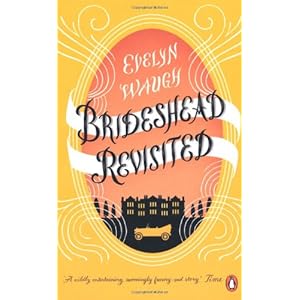
It is very difficult to embrace a book when you spend pretty much the entirety of the narrative wanting to punch at least one of the major characters in the snoot. Evelyn Waugh's Brideshead Revisited came across my radar after an unusual fashion. I had finished reading Jill Paton Walsh's The Attenbury Emeralds and wondered just how big these gigantic aristocratic country houses were meant to be. My take on things, having read a little about them, is that between the wars, Great Britain had better than a hundred of these gigantic Biltmore-sized estates, to use a scale that Southerners like me will recognize, which is an awful lot of great freaking big, ungainly houses in an awfully small area. In the same sized area here, we've got Biltmore and the RJ Reynolds Estate, I think, and that's it.
Anyway, Brideshead came recommended as a book that dealt with the decline of the country estates. I knew of the 1980s TV serial, of course, but mainly how it came to epitomize, in the US, the culture snobbery that informs perceptions of PBS's Masterpiece Theatre, despite the fact that it never actually aired on that anthology program. I checked out the novel and was, initially, taken with things. It starts during World War Two, and an officer named Charles Ryder's unit is billeted at the decrepit and crumbling Brideshead, prompting him to remember how well he remembered his time as a visitor here.
When Ryder was first introduced to Brideshead, it was as a guest of his college chum, Lord Sebastian Flyte, in the 1920s. They met at Oxford, and how Ryder failed to kick the drunk sissy in the tail, I can't guess. I don't know that I can recall a less sufferable character in fiction than Sebastian. Waugh, writing with a discreet and polite edge, masks their friendship in words and code that leave it to readers' interpretation of how close these two are. I understand that the more recent feature adaptation of the novel just goes full bore and depicts them as lovers, which is the most likely reading. Particularly after Lord Sebastian, the younger son of Lord Marchmain, the Marquess of Marchmain, later makes his way, embarrassingly, across Europe and North Africa in the company of other effeminate drunks, usually under the patient, understanding, tutelage of some priest or other, only the determined would insist there's no hanky panky going on here. Even without actually seeing the TV serial, you can still visualize how all these urbane, sensitive, blow-dried dimwits, as played by Jeremy Irons and Anthony Andrews influenced the New Romantic movement. I don't actually need to watch the TV Brideshead when a single Spandau Ballet video will do.
But Sebastian... well, he carries around a teddy bear named Aloysius. At college. He tells his barber that he needs a brush with extra-thick bristles for when Aloysius misbehaves and needs a jolly good spanking. What a pathetic, humiliating child. Did Morrissey read this book before he went onstage with a pocket full of gladiolas?
Charles ends up being asked by Sebastian's mother to leave Brideshead and never return after he goes well out of his way to enable Sebastian's drinking. So he goes off, continuing his burgeoning art career, marries another classmate's daughter, lovelessly, spends months in South America drawing things and preparing for a show, reacts to the news that his wife had a daughter, conceived the night he left, with all the interest one might give a rubber ball, and, just like that, I was ready to punch his snoot pretty viciously as well. But his wife Celia's not faithful - naturally, it would make things difficult if Charles was seen to be cruel - and Charles takes up with, of all people, Lady Julia, who is Sebastian's younger sister. And she's also in a marriage of convenience for some idiotic reason.
Let me go back to Walsh. One of the many things that she caught when she took up the characters of Lord Peter Wimsey and his family is that Dorothy L. Sayers made Helen, the Duchess of Denver, a completely awful shrew by virtue of her devotion to duty over love. This book is full of upper-class imbeciles who, like Helen, care more about duty than anything else, forcing them into situations where they excuse their awful, hideous behavior. Waugh puts an interesting twist on things by having the family feel very strongly about their responsibilities as Catholics. It guides their behavior in unexpected ways, particularly as Julia plans to marry the dumb cluck of her life, only to learn quite late in the day that he was divorced some years previously in Canada. It also sets up the climax, when Lord Marchmain comes home to die, taking for-bleeding-ever to do so, and the rules of Julia's faith suddenly throw everything in the air, ruining even the last salvage of something happening in this book that I wanted to see happen. And, just like that, I was ready to take a strong-bristled hairbrush to Lady Julia's rear.
If you can stand any of these idiots, you might be intrigued and interested in how Waugh constructs the novel, and be impressed by his use of language. On the other hand, I found it agonizing and downright exasperating, watching jerks treat each other contemptuously and without connection for years and years. I think most of them got the fates they deserved, but I couldn't even muster any reason to care. Not at all recommended.
No comments:
Post a Comment